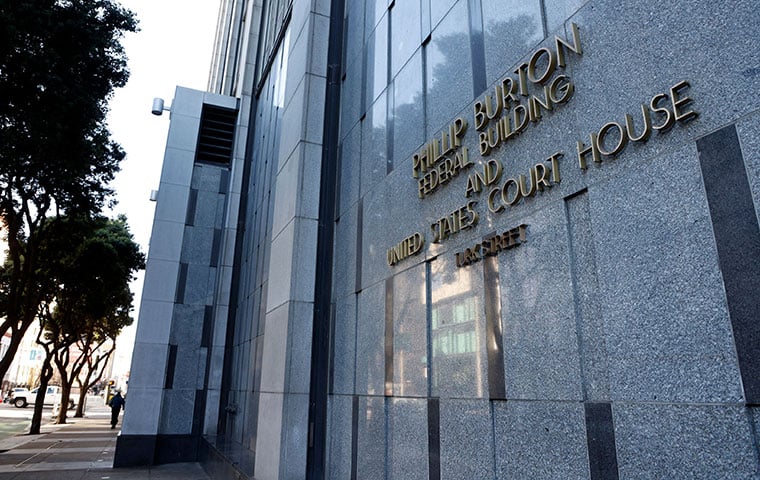 The Phillip Burton Federal Building and U.S. Courthouse: Notices had been issued at the Departments of Commerce, Education, Energy, Health and Human Services, Housing and Urban Development, Homeland Security, and Treasury, affecting thousands of federal employees. Image: JOHN G MABANGLO/EPA-EFE/Shutterstock
By: FEDweek Staff
The Phillip Burton Federal Building and U.S. Courthouse: Notices had been issued at the Departments of Commerce, Education, Energy, Health and Human Services, Housing and Urban Development, Homeland Security, and Treasury, affecting thousands of federal employees. Image: JOHN G MABANGLO/EPA-EFE/Shutterstock
By: FEDweek StaffA federal judge has issued a temporary restraining order against OMB from proceeding with RIFs amid the ongoing government shutdown. The ruling came on October 15, days after OMB confirmed that “substantial RIFs are taking place.”
Notices had been issued at the Departments of Commerce, Education, Energy, Health and Human Services, Housing and Urban Development, Homeland Security, and Treasury (topping the list at 1,446 employees), affecting thousands of federal employees. The EPA had also issued a general “intent to RIF” notice – with other defendant agencies said to be studying personnel and functions that could be targeted for cuts, according to the DoJ.
The AFGE and other unions filed suit earlier this month, alleging that the administration’s move to carry out RIFs during a funding lapse violated both statutory and constitutional due process protections. During the hearing, the court noted that government attorneys declined to argue the merits of the case, and Judge Illston subsequently affirmed her tentative ruling from the bench, issuing an oral restraining order and stating that a written opinion would follow.
The court’s order – from Judge Susan Illston of the U.S. District Court for the Northern District of California – halts all RIF-related actions—including notices previously sent to employees at several departments—until a preliminary injunction hearing can be held.
The restraining order is a check to White House threats to use the lapse in funding to further reduce personnel and programs. President Trump had called the shutdown “an unprecedented opportunity” to do so, and OMB had instructed agencies to use the funding lapse as justification to initiate RIF procedures. Trump said at a cabinet meeting on last week that “We’re only cutting Democrat programs.”
Ahead of the shutdown, OMB told agencies to use the lapse as an opportunity to send RIF notices to all employees in affected functions, regardless of whether they are furloughed or kept at work unpaid. Once funding is restored, they are to cancel those notices—which typically give a 60-day warning—for a minimum number of employees needed to fulfill legal requirements and allow the remainder to take effect.
Later OPM guidance told agencies that they could keep employees who otherwise would be furloughed on the job to carry out the planning needed to conduct RIFs.
While the White House had cited budgetary and operational streamlining goals, employee unions and others have warned that such actions during a shutdown were unlawful and destabilizing. “This decision affirms that these threatened mass firings are likely illegal and blocks layoff notices from going out,” said AFSCME President Lee Saunders.
A preliminary injunction hearing is expected to be scheduled within the coming weeks, and the temporary restraining order will remain in effect until that hearing concludes.
Federal employees can challenge RIFs before the MSPB on grounds that required procedures were not followed, although that agency also is shut down and temporarily is not accepting new appeals, even those filed electronically. Deadlines in cases already pending there are being pushed back by the number of days the shutdown lasts.
Legal grounds for challenging a RIF include:
- Procedural Due Process & Harmful Procedural Error
- Retention Factors Misapplied
- Bump/Retreat Errors
- Competitive Area Manipulation
- Transfer-of-Function & Reorganization Issues
- Veterans’ Preference Violations
Large Share of Federal Workforce about to Experience a Payless Pay Period
OPM Details Coverage Changes, Plan Dropouts for FEHB/PSHB in 2026
OMB Says Federal Workforce RIFs are Starting as Shutdown Drags On
Financial Impact of Shutdown Starts to Hit Home; WH Threatens No Back Pay
Surge of Retirement Applications Is in the Pipeline, Says OPM
See also,
TSP Takes Step toward Upcoming In-Plan Roth Conversions
5 Steps to Protect Your Federal Job During the Shutdown
Over 30K TSP Accounts Have Crossed the Million Mark in 2025
The Best Ages for Federal Employees to Retire

